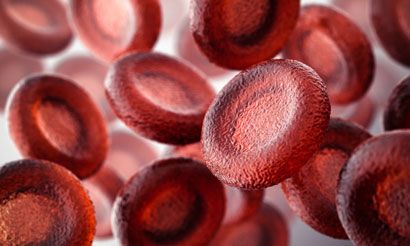Voxtalisib Shows Promising Activity in Follicular Lymphoma
Voxtalisib (XL765) monotherapy induced objective responses in 41.3% of patients with follicular lymphoma, but displayed minimal efficacy in patients with other lymphomas, according to results from a phase II trial of patients with relapsed or refractory lymphoma or chronic lymphocytic leukemia that were recently published in the Lancet Haematology.

Voxtalisib (XL765) monotherapy induced objective responses in 41.3% of patients with follicular lymphoma (FL), but displayed minimal efficacy in patients with other lymphomas, according to results from a phase II trial of patients with relapsed or refractory lymphoma or chronic lymphocytic leukemia (CLL) that were recently published in theLancet Haematology.
Thirty (18.3%) of 164 patients evaluable for efficacy in this multicenter, non-randomized, open-label phase II trial achieved an overall response (partial, n = 22; complete, n = 8). Nineteen (41.3%) patients with FL (n = 46) responded to treatment compared with 5 (11.9%) of 42 with mantle cell lymphoma (MCL), 2 (4.9%) of 41 with diffuse large B-cell lymphoma (DLBCL), and 4 (11.4%) of 35 with CLL/small lymphocytic lymphoma (SLL).
A total of 167 patients enrolled at 30 oncology clinics in the United States, Belgium, Germany, France, the Netherlands, and Australia from October 2011 to July 2013. Patients who achieved a clinical benefit were allowed to continue treatment in an extension study after the September 2014 data cutoff.
Eligible adults had an ECOG performance status of 0 to 2 and relapsed/refractory disease. Patients had received a median of 3 previous anticancer regimens was 3 (range, 2-4) for patients with lymphoma and 4 (range, 2-5) for patients with CLL/SLL.
All patients received 50 mg of twice-daily voxtalisib, a reversible inhibitor of all 4 class I PI3Ks and a weaker inhibitor of mTOR, in 28-day continuous dosing cycles until disease progression or unacceptable toxicity. The study protocol recommended giving prophylactic medications to immunocompromised patients and to patients with CLL and a CD4 lymphocyte count >200 cells/μL to prevent reactivation of viral diseases and opportunistic infections.
Investigators analyzed the duration of follow-up for 33 patients with MCL, 43 with follicular lymphoma, 35 with DLBCL, and 32 with CLL/SLL. The median follow-up was 16.4 weeks overall (range, 8.1-36.0), and 12.6 weeks (range, 8.1-26.6) for MCL, 32.0 weeks (range, 15.9-64.2) for FL, 8.1 weeks (range, 4.9-11.0) for DLBCL, and 27.9 weeks (range, 14.7-50.1) for CLL/SLL.
Eight patients (4.9%) had a complete response (CR), including 3 (7.1%) in the MCL group and 5 (10.9%) in the FL group. Fourteen partial responses (30.4%) were observed in the FL group, 4 (11.4%) in the CLL/SLL group, and 2 each in the MCL and DLBCL groups (4.8% and 4.9%, respectively). An additional 55 patients (33.5%) had stable disease.
The median duration of response was 23.4 weeks (range, 9.3-37.4) for the 3 patients with MCL who had a CR. Conversely, the median duration of response was 85.0 weeks (range, 71.6-88.3) for patients in CR in the FL group. All 5 of those patients were still responding at the time of data cutoff.
Median overall progression-free survival (PFS) was 14.4 weeks (95% CI, 9.0-19.4). The median PFS was 8.9 weeks (95% CI, 7.9-12.9) for patients with MCL, 58.0 weeks (95% CI, 26.0-not calculated) for FL, 7.1 weeks (95% CI, 5.1-8.1) for DLBCL, and 24.1 weeks (95% CI, 16.6-31.6) for patients with CLL/SLL.
Overall PFS rate at 24 weeks was 38.6% (95% CI, 30.9%-46.3%) compared with 24.5% (95% CI, 11.1%-38.0%) for MCL, 65.7% (95% CI, 51.6%-79.8%) for FL, 10.5% (95% CI, 0.3%-20.7%) for DLBCL, and 51.9% (95% CI, 34.8%-69.0%) for CLL/SLL.
An analysis of 37 patients with follicular lymphoma used targeted next-generation sequencing to examine biomarkers for response; however, there was insufficient evidence found for an association between any of the documented alterations and response to treatment. “Responses were independent of PI3K/mTOR pathway alterations, possibly because the pathway is typically constitutively activated in most lymphomas,” the study authors, led by Jennifer R. Brown, MD, of Dana-Farber Cancer Institute, wrote in their study.
The most frequently reported adverse events (AEs) regardless of causality were diarrhea (35%), fatigue (32%), nausea (27%), pyrexia (26%), cough (24%), and decreased appetite (21%). The most frequently reported grade ≥3 AEs regardless of causality were anemia (12%), pneumonia (8%), and thrombocytopenia (8%).
Ninety-seven patients (58%) experienced serious AEs, most frequently pneumonia (10%), general physical health deterioration (7%), disease progression (6%), and pyrexia (5%). Twenty-nine patients (17%) had treatment-related serious AEs.
Hematologic laboratory abnormalities were also common, typically anemia (any-grade, 80%; grade 3-4, 12%), decreased platelets (any-grade, 75%; grade 3-4, 17%), decreased lymphocytes (any-grade, 67%; grade 3-4, 39%), leukopenia (any-grade, 55%; grade 3-4, 13%), and decreased neutrophils (any-grade, 46%; grade 3-4, 21%).
Thirty-three patients (20%) discontinued treatment due to AEs, most frequently nausea and pyrexia (2% each). Overall, 123 (74%) patients required at least 1 dose modification.
Overall, 53 patients (32%) died, with 43 deaths directly attributed to disease progression. Eight deaths were due to AEs, none of which were related to voxtalisib treatment.
The study authors noted that no further study is planned for voxtalisib in patients with CLL, but further investigation is warranted in the FL patient population.
Reference:
Brown JR, Hamadani M, Hayslip J, et al. Voxtalisib (XL765) in patients with relapsed or refractory non-Hodgkin lymphoma or chronic lymphocytic leukaemia: an open-label, phase 2 trial [published online March 14, 2018].Lancet Haematol. 2018; 5(4):e170-e180. doi: 10.1016/S2352-3026(18)30030-9.
Considering the Durability of Zanubrutinib in Relapsed/Refractory CLL
April 11th 2024During a Case-Based Roundtable® event, Marc S. Hoffmann, MD, discussed his viewpoints on the use of Bruton tyrosine kinase inhibitors for patients with relapsed/refractory chronic lymphocytic leukemia and the efficacy behind zanubrutinib in the second article of a 2-part series.
Read More